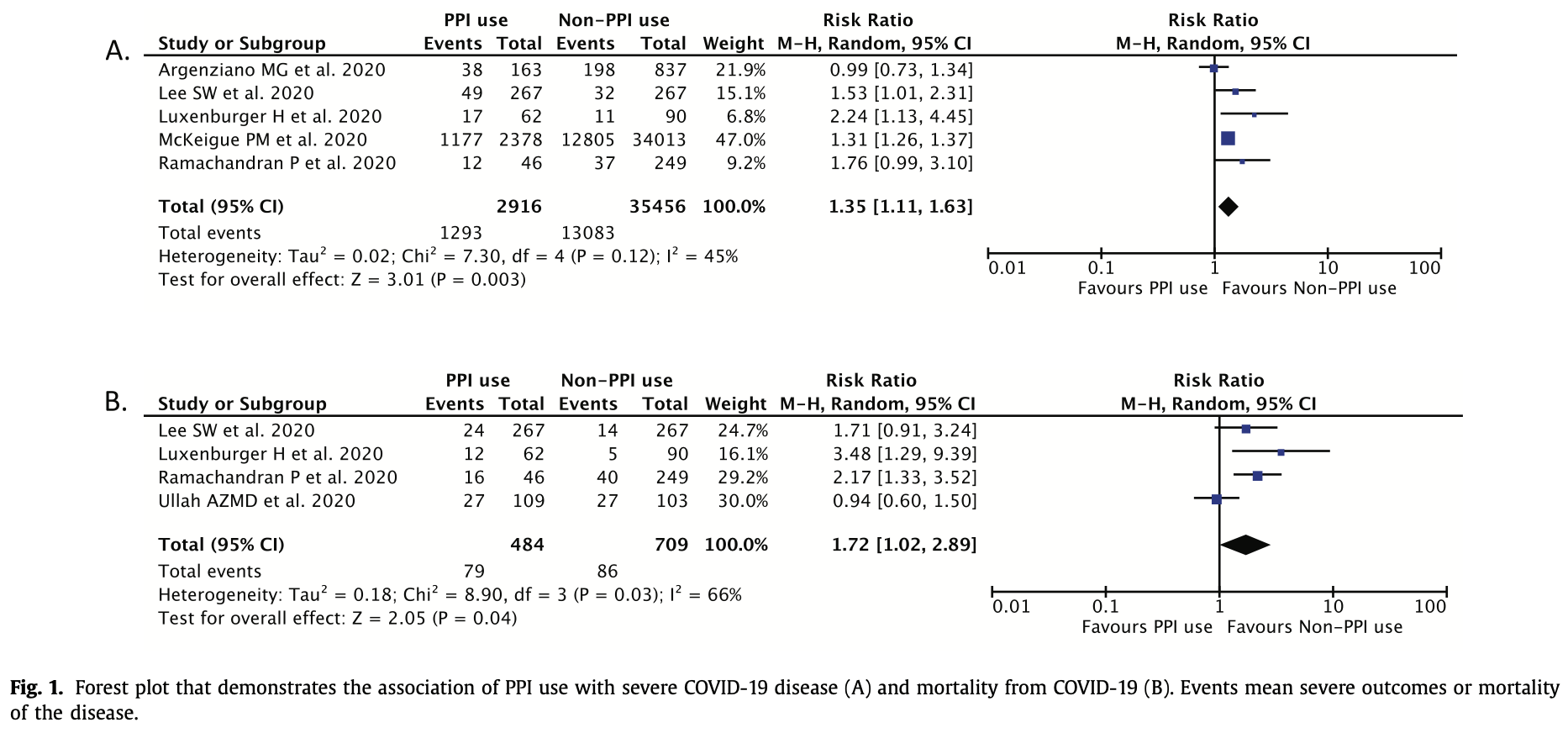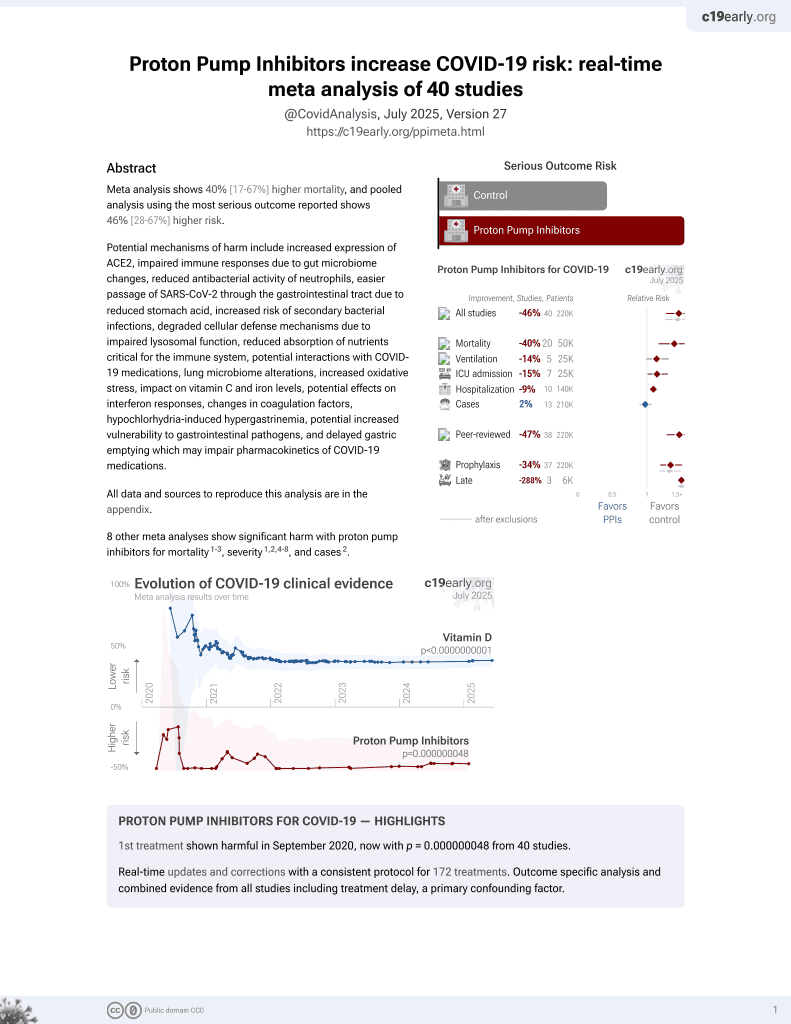
Proton pump inhibitor use is associated with increased risk of severity and mortality from coronavirus disease 2019 (COVID-19) infection
et al., Digestive and Liver Disease, doi:10.1016/j.dld.2020.10.001, Dec 2020
PPIs for COVID-19
1st treatment shown to increase risk in
September 2020, now with p = 0.000000048 from 40 studies.
6,400+ studies for
210+ treatments. c19early.org
|
Meta analysis of 6 studies with 5,884 COVID-19 patients showing significantly higher severity and mortality with proton pump inhibitor (PPI) usage.
8 meta-analyses show significant harm with proton pump inhibitors for mortality1-3,
severity1,2,4-8 , and
cases2.
Currently there are 40 proton pump inhibitors for COVID-19 studies, showing 40% higher mortality [17‑67%], 14% higher ventilation [-1‑32%], 15% higher ICU admission [1‑30%], 9% higher hospitalization [3‑16%], and 2% fewer cases [-6‑10%].
|
risk of death, 72.0% higher, RR 1.72, p = 0.04.
|
|
risk of severe case, 35.0% higher, RR 1.35, p = 0.002.
|
| Effect extraction follows pre-specified rules prioritizing more serious outcomes. Submit updates |
1.
Hariyanto et al., Proton pump inhibitor use is associated with increased risk of severity and mortality from coronavirus disease 2019 (COVID-19) infection, Digestive and Liver Disease, doi:10.1016/j.dld.2020.10.001.
2.
Fatima et al., The Use of Proton Pump Inhibitors and COVID-19: A Systematic Review and Meta-Analysis, Tropical Medicine and Infectious Disease, doi:10.3390/tropicalmed7030037.
3.
Toubasi et al., Proton Pump Inhibitors: Current Use and the Risk of Coronavirus Infectious Disease 2019 Development and its Related Mortality. Meta-analysis, Archives of Medical Research, doi:10.1016/j.arcmed.2021.03.004.
4.
Wardhana et al., Different Outcome in COVID-19 Patients with or without PPI Use: A Systematic Review and Meta-analysis, International Journal of Biomedical Science and Travel Medicine, doi:10.22225/ijbstm.1.1.2024.19-23.
5.
Yan et al., Does Proton Pump Inhibitor Use Lead to a Higher Risk of Coronavirus Disease 2019 Infection and Progression to Severe Disease? a Meta-analysis, Japanese Journal of Infectious Diseases, doi:10.7883/yoken.JJID.2021.074.
6.
Li et al., Do proton pump inhibitors influence SARS-CoV-2 related outcomes? A meta-analysis, Gut, doi:10.1136/gutjnl-2020-323366.
Hariyanto et al., 31 Dec 2020, peer-reviewed, 3 authors.
Abstract: Digestive and Liver Disease 52 (2020) 1410–1412
Contents lists available at ScienceDirect
Digestive and Liver Disease
journal homepage: www.elsevier.com/locate/dld
Correspondence
Proton pump inhibitor use is associated with increased
risk of severity and mortality from coronavirus disease
2019 (COVID-19) infection
Dear Editor,
World Health Organization (WHO) first declared coronavirus
disease 2019 (COVID-19) as a pandemic in March 2020, and now,
six months after that, the number of positive and death cases
are still increasing. This global pandemic has caused a significant
impact on health, social, and economic aspects around the world.
Thus, identification of the risk factors that contribute to the
development of severe infections is important to enabling risk
stratification, optimizing the hospital resources reallocation, and
guiding public health recommendations and interventions. Several
medications have been demonstrated to be associated with a
reduction in poor outcomes from COVID-19 such as anticoagulant
and metformin, while other medications did not alter outcomes of
COVID-19 infections such as ACE inhibitors, angiotensin II receptor
blocker (ARB), and statin [1-3]. During normal times, proton pump
inhibitors (PPIs) are among the drugs which are most commonly
used by patients because of their efficacy in relieving dyspepsia
and GERD symptoms, also because of their relatively affordable
price [4]. In a previous meta-analysis study, it has been shown that
the use of proton pump inhibitors (PPIs) may increase the risk of
pneumonia even though the heterogeneity of the study is high [5].
Unfortunately, until now, the evidence regarding the link between
the use of PPI and COVID-19 outcomes is still conflicting. This
article aims to give better evidence for the association between
PPI usage and in-hospital outcomes (severity and mortality) of
COVID-19 infection.
A search of the literature was conducted on Google scholar using the keywords “proton pump inhibitors” OR “PPI” OR “clinical
characteristics” OR “medications” OR “risk factors” AND “coronavirus disease 2019” OR “COVID-19”, between 2019 and present
time (September 10th, 2020) with language restricted to English
only. The title, abstract, and full text of all articles identified that
matched the search criteria were assessed, and those reporting the
rate of PPI usage in COVID-19 patients with a clinically validated
definition of “severe disease” and “mortality” were included in this
meta-analysis. The references of all identified studies were also analyzed (forward and backward citation tracking) to identify other
potentially eligible articles.
A meta-analysis was performed using Review Manager 5.4
(Cochrane Collaboration) software. Dichotomous variables were
calculated using the Mantel-Haenszel formula with random-effects
models. The heterogeneity was assessed by using the I2 statistic
with a value of < 25%, 26–50%, and > 50% were considered as
low, moderate, and high degrees of heterogeneity, respectively. The
effect estimate was reported as risk ratio (RR) along with its 95%
confidence intervals (CIs) for dichotomous variables, respectively.
P-value was two-tailed, and the statistical significance was set at
≤ 0.05.
A total of 7300 records were obtained through systematic electronic searches and other ways. After screening titles, abstracts,
and full texts, 6 studies [6-11] with a total of 5884 COVID-19 patients were included in the meta-analysis (Table 1). The individual
and pooled..
DOI record:
{
"DOI": "10.1016/j.dld.2020.10.001",
"ISSN": [
"1590-8658"
],
"URL": "http://dx.doi.org/10.1016/j.dld.2020.10.001",
"alternative-id": [
"S1590865820309300"
],
"assertion": [
{
"label": "This article is maintained by",
"name": "publisher",
"value": "Elsevier"
},
{
"label": "Article Title",
"name": "articletitle",
"value": "Proton pump inhibitor use is associated with increased risk of severity and mortality from coronavirus disease 2019 (COVID-19) infection"
},
{
"label": "Journal Title",
"name": "journaltitle",
"value": "Digestive and Liver Disease"
},
{
"label": "CrossRef DOI link to publisher maintained version",
"name": "articlelink",
"value": "https://doi.org/10.1016/j.dld.2020.10.001"
},
{
"label": "Content Type",
"name": "content_type",
"value": "simple-article"
},
{
"label": "Copyright",
"name": "copyright",
"value": "© 2020 Editrice Gastroenterologica Italiana S.r.l. Published by Elsevier Ltd. All rights reserved."
}
],
"author": [
{
"affiliation": [],
"family": "Hariyanto",
"given": "Timotius Ivan",
"sequence": "first"
},
{
"affiliation": [],
"family": "Prasetya",
"given": "Ignatius Bima",
"sequence": "additional"
},
{
"affiliation": [],
"family": "Kurniawan",
"given": "Andree",
"sequence": "additional"
}
],
"container-title": "Digestive and Liver Disease",
"container-title-short": "Digestive and Liver Disease",
"content-domain": {
"crossmark-restriction": true,
"domain": [
"clinicalkey.fr",
"clinicalkey.jp",
"dldjournalonline.com",
"clinicalkey.es",
"clinicalkey.com.au",
"clinicalkey.com",
"elsevier.com",
"sciencedirect.com"
]
},
"created": {
"date-parts": [
[
2020,
10,
6
]
],
"date-time": "2020-10-06T20:50:09Z",
"timestamp": 1602017409000
},
"deposited": {
"date-parts": [
[
2024,
5,
27
]
],
"date-time": "2024-05-27T17:15:31Z",
"timestamp": 1716830131000
},
"indexed": {
"date-parts": [
[
2024,
7,
19
]
],
"date-time": "2024-07-19T01:37:24Z",
"timestamp": 1721353044512
},
"is-referenced-by-count": 34,
"issue": "12",
"issued": {
"date-parts": [
[
2020,
12
]
]
},
"journal-issue": {
"issue": "12",
"published-print": {
"date-parts": [
[
2020,
12
]
]
}
},
"language": "en",
"license": [
{
"URL": "https://www.elsevier.com/tdm/userlicense/1.0/",
"content-version": "tdm",
"delay-in-days": 0,
"start": {
"date-parts": [
[
2020,
12,
1
]
],
"date-time": "2020-12-01T00:00:00Z",
"timestamp": 1606780800000
}
},
{
"URL": "https://www.elsevier.com/legal/tdmrep-license",
"content-version": "tdm",
"delay-in-days": 0,
"start": {
"date-parts": [
[
2020,
12,
1
]
],
"date-time": "2020-12-01T00:00:00Z",
"timestamp": 1606780800000
}
}
],
"link": [
{
"URL": "https://api.elsevier.com/content/article/PII:S1590865820309300?httpAccept=text/xml",
"content-type": "text/xml",
"content-version": "vor",
"intended-application": "text-mining"
},
{
"URL": "https://api.elsevier.com/content/article/PII:S1590865820309300?httpAccept=text/plain",
"content-type": "text/plain",
"content-version": "vor",
"intended-application": "text-mining"
}
],
"member": "78",
"original-title": [],
"page": "1410-1412",
"prefix": "10.1016",
"published": {
"date-parts": [
[
2020,
12
]
]
},
"published-print": {
"date-parts": [
[
2020,
12
]
]
},
"publisher": "Elsevier BV",
"reference": [
{
"article-title": "Metformin use is associated with reduced mortality rate from coronavirus disease 2019 (COVID-19) infection",
"author": "Hariyanto",
"journal-title": "Obes Med",
"key": "10.1016/j.dld.2020.10.001_bib0001",
"volume": "19",
"year": "2020"
},
{
"DOI": "10.1016/j.dsx.2020.06.047",
"article-title": "The use of renin angiotensin system inhibitor on mortality in patients with coronavirus disease 2019 (COVID-19): a systematic review and meta-analysis",
"author": "Pranata",
"doi-asserted-by": "crossref",
"first-page": "983",
"issue": "5",
"journal-title": "Diabetes Metab Syndr",
"key": "10.1016/j.dld.2020.10.001_bib0002",
"volume": "14",
"year": "2020"
},
{
"DOI": "10.1016/j.dsx.2020.08.023",
"article-title": "Statin therapy did not improve the in-hospital outcome of coronavirus disease 2019 (COVID-19) infection",
"author": "Hariyanto",
"doi-asserted-by": "crossref",
"first-page": "1613",
"issue": "6",
"journal-title": "Diabetes Metab Syndr",
"key": "10.1016/j.dld.2020.10.001_bib0003",
"volume": "14",
"year": "2020"
},
{
"DOI": "10.1053/j.gastro.2004.08.026",
"article-title": "The efficacy of proton pump inhibitors in nonulcer dyspepsia: a systematic review and economic analysis",
"author": "Moayyedi",
"doi-asserted-by": "crossref",
"first-page": "1329",
"issue": "5",
"journal-title": "Gastroenterology",
"key": "10.1016/j.dld.2020.10.001_bib0004",
"volume": "127",
"year": "2004"
},
{
"DOI": "10.1080/14740338.2019.1577820",
"article-title": "Proton pump inhibitors therapy and the risk of pneumonia: a systematic review and meta-analysis of randomized controlled trials and observational studies",
"author": "Wang",
"doi-asserted-by": "crossref",
"first-page": "163",
"issue": "3",
"journal-title": "Expert Opin Drug Saf",
"key": "10.1016/j.dld.2020.10.001_bib0005",
"volume": "18",
"year": "2019"
},
{
"DOI": "10.1136/bmj.m1996",
"article-title": "Characterization and clinical course of 1000 patients with coronavirus disease 2019 in New York: retrospective case series",
"author": "Argenziano",
"doi-asserted-by": "crossref",
"first-page": "m1996",
"journal-title": "BMJ",
"key": "10.1016/j.dld.2020.10.001_bib0006",
"volume": "369",
"year": "2020"
},
{
"article-title": "Severe clinical outcomes of COVID-19 associated with proton pump inhibitors: a nationwide cohort study with propensity score matching",
"author": "Lee",
"journal-title": "Gut",
"key": "10.1016/j.dld.2020.10.001_bib0007",
"year": "2020"
},
{
"article-title": "Treatment with proton pump inhibitors increases the risk of secondary infections and ARDS in hospitalized patients with COVID-19: coincidence or underestimated risk factor?",
"author": "Luxenburger",
"journal-title": "J Intern Med.",
"key": "10.1016/j.dld.2020.10.001_bib0008",
"year": "2020"
},
{
"article-title": "Associations of severe COVID-19 with polypharmacy in the REACT-SCOT case-control study",
"author": "McKeigue",
"journal-title": "medRxiv.",
"key": "10.1016/j.dld.2020.10.001_bib0009",
"year": "2020"
},
{
"article-title": "Prehospitalization proton pump inhibitor (PPI) use and clinical outcomes in COVID-19",
"author": "Ramachandran",
"journal-title": "medRxiv.",
"key": "10.1016/j.dld.2020.10.001_bib0010",
"year": "2020"
},
{
"article-title": "COVID-19 in patients with hepatobiliary and pancreatic diseases in East London: a single-centre cohort study",
"author": "Ullah",
"journal-title": "medRxiv.",
"key": "10.1016/j.dld.2020.10.001_bib0011",
"year": "2020"
},
{
"DOI": "10.1007/s11894-008-0098-4",
"article-title": "Pharmacology of proton pump inhibitors",
"author": "Shin",
"doi-asserted-by": "crossref",
"first-page": "528",
"issue": "6",
"journal-title": "Curr Gastroenterol Rep",
"key": "10.1016/j.dld.2020.10.001_bib0012",
"volume": "10",
"year": "2008"
},
{
"article-title": "Fecal-oral transmission of COVID-19: could hypochlorhydria play a role?",
"author": "Dibner",
"journal-title": "J Med Virol.",
"key": "10.1016/j.dld.2020.10.001_bib0013",
"year": "2020"
},
{
"DOI": "10.2174/1389200219666171207125351",
"article-title": "Adverse events of proton pump inhibitors: potential mechanisms",
"author": "Corsonello",
"doi-asserted-by": "crossref",
"first-page": "142",
"issue": "2",
"journal-title": "Curr Drug Metab",
"key": "10.1016/j.dld.2020.10.001_bib0014",
"volume": "19",
"year": "2018"
},
{
"DOI": "10.1016/j.dld.2020.04.020",
"article-title": "Latest insights into the hot question of proton pump inhibitor safety - a narrative review",
"author": "Savarino",
"doi-asserted-by": "crossref",
"first-page": "842",
"issue": "8",
"journal-title": "Dig Liver Dis",
"key": "10.1016/j.dld.2020.10.001_bib0015",
"volume": "52",
"year": "2020"
},
{
"DOI": "10.1016/j.dld.2016.05.018",
"article-title": "Are proton pump inhibitors really so dangerous?",
"author": "Savarino",
"doi-asserted-by": "crossref",
"first-page": "851",
"issue": "8",
"journal-title": "Dig Liver Dis.",
"key": "10.1016/j.dld.2020.10.001_bib0016",
"volume": "48",
"year": "2016"
},
{
"DOI": "10.1111/j.1365-2710.2008.00907.x",
"article-title": "A succinct review of the general and immunological pharmacologic effects of proton pump inhibitors",
"author": "Namazi",
"doi-asserted-by": "crossref",
"first-page": "215",
"issue": "3",
"journal-title": "J Clin Pharm Ther",
"key": "10.1016/j.dld.2020.10.001_bib0017",
"volume": "33",
"year": "2008"
}
],
"reference-count": 17,
"references-count": 17,
"relation": {},
"resource": {
"primary": {
"URL": "https://linkinghub.elsevier.com/retrieve/pii/S1590865820309300"
}
},
"score": 1,
"short-title": [],
"source": "Crossref",
"subject": [],
"subtitle": [],
"title": "Proton pump inhibitor use is associated with increased risk of severity and mortality from coronavirus disease 2019 (COVID-19) infection",
"type": "journal-article",
"update-policy": "http://dx.doi.org/10.1016/elsevier_cm_policy",
"volume": "52"
}
